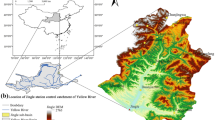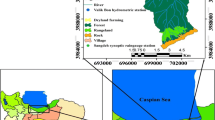Abstract
This paper makes an improvement on the traditional flood forecasting method. There are two shortcomings in the conventional prediction process. First, it is not rigorous for clustering by selecting fixed features. Many factors affect the flood, so this leads the loss of useful information and inaccurate clustering results. Second, number of clusters is also fixed, the optimal clustering under multiple clusters is not studied. For the above problems, we propose a new approach by increasing the impact of flood properties before the fuzzy C-means clustering and improving the PCA analysis through leveraging the KMO test and Bartlett test to determine the advantages and disadvantages of the data set to extract, we utilize the gravel map to determine the number of extraction of the main components. When using our improved approach for flood prediction, it can effectively filter out useless and redundant information, and reduce the dimension of high-dimensional data. Then based on the processed data, we use pseudo-F statistics to discover optimal quantity of clusters, and use BP neural network to classify outputs online. After the improvement, we find that the system can achieve higher accuracy for the classification of floods and overcome the shortcomings of the traditional flood forecasting method.
Access this chapter
Tax calculation will be finalised at checkout
Purchases are for personal use only
Similar content being viewed by others
References
Ren, M.L.: Research on classified flood forecast based on fuzzy clustering and BP neural networks. J. Dalian Univ. Technol. 49(1), 121–127 (2009)
Liu, K., Bao, W., Que, J., et al.: Application of K-mean cluster method to flood forecasting based on principal component analysis. Eng. J. Wuhan Univ. 48, 448–458 (2015)
Ni, P., Bao, W., Zhang, Q., et al.: Application of hierarchical cluster analysis to flood forecasting based on principal component analysis. J. China Three Gorges Univ. 1–4 (2018)
Wang, C., Wei, N., Xie, J., et al.: Scheme optimization of Jialingjiang-to-Hanjiang river water transfer project based on multi-objective fuzzy optimization model. J. Water Resour. Water Eng. 144–148 (2018)
Vogol, M.A., Wong, A.K.C.: PFS clustering method. IEEE Trans. PAMI 1(3), 237–245 (1979)
Xie, K., Zhang, J.: Short-term wind speed forecasting using PCA-WNN based on KMO-Bartlett typical wind speed selection. Power Equip. 86–91 (2017)
Li, H.: Evaluation on quality of medical treatment by pseudo F-statistics fuzzy clustering method. Chin. J. Hosp. Stat. 51, 113–115 (2005)
Jin, J., Zhang, Y., Wang, W.: Optimal fuzzy equivalent matrix-base fuzzy clustering method for hydrological station classification. IAHS-AISH Publication, 447–458 (2007)
Lin, L.: Specific emitter identification based on ambiguity function. J. Electron. Inf. Technol. 31(11), 2546–2551 (2009)
García, S.L., Magdalena, L., Velasco, J.R.: Cluster validity for FCM clustering algorithm using uniform data. In: Eusflat-Estylf Joint Conference, Palma De Mallorca, Spain, September. DBLP, pp. 501–504 (2009)
Author information
Authors and Affiliations
Corresponding author
Editor information
Editors and Affiliations
Rights and permissions
Copyright information
© 2019 Springer Nature Singapore Pte Ltd.
About this paper
Cite this paper
Wang, W., Tang, Y. (2019). Watershed Flood Forecasting Based on Cluster Analysis and BP Neural Network. In: Sun, Y., Lu, T., Xie, X., Gao, L., Fan, H. (eds) Computer Supported Cooperative Work and Social Computing. ChineseCSCW 2018. Communications in Computer and Information Science, vol 917. Springer, Singapore. https://doi.org/10.1007/978-981-13-3044-5_37
Download citation
DOI: https://doi.org/10.1007/978-981-13-3044-5_37
Published:
Publisher Name: Springer, Singapore
Print ISBN: 978-981-13-3043-8
Online ISBN: 978-981-13-3044-5
eBook Packages: Computer ScienceComputer Science (R0)




